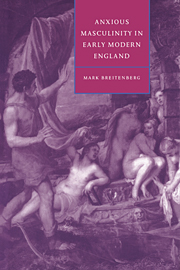Book contents
- Frontmatter
- Contents
- Acknowledgments
- Introduction
- 1 Fearful fluidity: Burton's Anatomy of Melancholy
- 2 Purity and the dissemination of knowledge in Bacon's new science
- 3 Publishing chastity: Shakespeare's “The Rape of Lucrece”
- 4 The anatomy of masculine desire in Love's Labor's Lost
- 5 Inscriptions of difference: cross-dressing, androgyny and the anatomical imperative
- 6 Ocular proof: sexual jealousy and the anxiety of interpretation
- Notes
- Index
6 - Ocular proof: sexual jealousy and the anxiety of interpretation
Published online by Cambridge University Press: 19 November 2009
- Frontmatter
- Contents
- Acknowledgments
- Introduction
- 1 Fearful fluidity: Burton's Anatomy of Melancholy
- 2 Purity and the dissemination of knowledge in Bacon's new science
- 3 Publishing chastity: Shakespeare's “The Rape of Lucrece”
- 4 The anatomy of masculine desire in Love's Labor's Lost
- 5 Inscriptions of difference: cross-dressing, androgyny and the anatomical imperative
- 6 Ocular proof: sexual jealousy and the anxiety of interpretation
- Notes
- Index
Summary
Who dotes, yet doubts, suspects, yet strongly loves!
Othello III.iii. 174In all the discussions so far, men have shown a tenacious preoccupation with female chastity. It thus seems appropriate to conclude this study by addressing that singularly most dreadful exhibition of anxious masculinity in the early modern period: sexual jealousy. Burton is not at all unusual in his depiction of jealousy as the most prominent and devastating of the melancholy tempers: “it ought to be treated as a Species apart,” he writes, “being of so great and eminent note, so furious a passion, and almost of as great extent as Love itself” (821). Burton's humoural psychology finds in jealousy perhaps the most severe example of the body's perturbed and imbalanced fluidity, the most complete overthrow of the rule of reason. But he also suggests throughout The Anatomy, mostly in his citations of numerous other writers on the subject, that male sexual jealousy is an unavoidable consequence of love and desire and, as such, a constituent part of masculinity. This is true for Burton because all men share the same material basis for jealousy as a result of their volatile fluidity; indeed, jealousy and melancholy are so inextricable that Burton wonders which is the cause and which the effect. In the following discussion, I suspend the humoural explanation that this period took for granted in order to pursue jealousy as an anxiety and a potential source of violence engendered in men by an economy that constructs masculine identity as dependent on the coercive and symbolic regulation of women's sexuality.
- Type
- Chapter
- Information
- Anxious Masculinity in Early Modern England , pp. 175 - 201Publisher: Cambridge University PressPrint publication year: 1996

